Event Reports
8th World Conference on Research Integrity, WCRI (2-5 Jun '24)
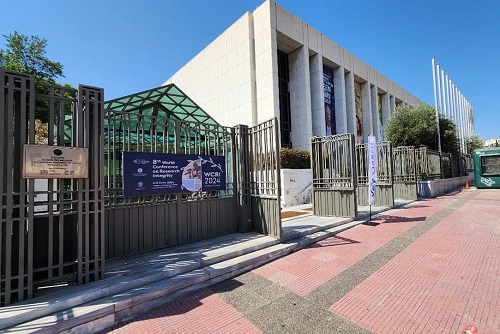
The WCRI are the world's largest conferences related to promoting research integrity and responsible conduct of research. This year's one saw the highest-ever attendance, with over 800 (registered) participants, including researchers, educators, and staff from research funding agencies, academic publishers, and research integrity offices. Gathering from all around the world, they gave presentations and had discussions on a wide variety of topics related to research integrity.
This report gives an overview of the conference, the discussions on the main theme --"Catalysing the translation of research into trustworthy policy and innovation"-- and covers some other topics as well.
8th World Conference on Research Integrity (8th WCRI)
Since the 1st WCRI was held in Lisbon in 2007, the WCRI has been a global conference on research integrity with the aim of presentations, discussions, policy harmonization, and collaborative action in an international forum. The conferences have organized roughly every two years, shifting to a different continent (Europe, the Americas, Asia, and Africa) each time. With the spread of the concept of research integrity, a wide range of people are taking part. They include researchers from diverse research fields some from ethics to meta-science; people who put research integrity into practice, such as research integrity office staff from various countries; and people from governments, funding agencies, publishers, and companies.Since the second conference in Singapore in 2010, statements, etc. on research integrity that bear the name of the host city have been considered, and the following have been issued.
Statements, etc. at past WCRI
(https://www.jst.go.jp/kousei_p/en/guidelines.html#gl_foreign_countries)
The 8th WCRI featured 20 plenaries and symposia, 37 oral presentation sessions, and 200 poster presentations, all in the space of four days. The titles of the main sessions are shown below. In addition to topics related to the theme of this conference --"Catalysing the translation of research into trustworthy policy and innovation"-- themes such as the following were also discussed: reproducibility of research results; fairness and equity; paper mills; the relationship between generative AI and research integrity; research culture within organizations; research ethics education (training in general and of leaders in particular); and the handling of clinical trial data. Besides these, the oral sessions and other events saw reports and active Q&A sessions on topics including the following: various trends in things like research misconduct and retractions of papers; discussions on the classification of research misconduct, including questionable research practices (QRPs); and efforts regarding international collaborative projects by researchers, etc.
8th WCRI themes in major sessions
<Plenary Sessions>
・The effects of Research Integrity on innovation and policy making
・The future(s) of reproducibility: how reproducibility reform improves research integrity
・The 7th WCRI Cape Town statement on fostering research integrity through fairness and equity one year on
・Addressing the challenge of paper mills through research and policy
・Tackling racial and ethnic bias when translating research into policy
・Perspectives on Research Integrity and Generative Artificial Intelligence
<Symposia>
・Leadership in Promoting a Research Culture with Integrity in Institutions
・The impact of generative AI on integrity in education, research, and the translation of research into policy
・Implications of research integrity for public trust in academic research
・A snapshot of knowledge on research integrity from research presented in the doctoral forum of the world conferences: a bird's eye view on the findings
・Leveraging policies to influence and enhance responsible conduct of research (RCR)
・Research integrity: improving training and trainer quality
・The intersection of research integrity and academic integrity: multi-country perspectives
・Toward responsible clinical trial data sharing practices
・A policy agenda to address industry influence on research integrity
・Governance of research integrity in the era of open science
8th WCRI web site https://www.wcrif.org/conferences/8th-wcri-athens-2024
<Plenary Sessions>
・The effects of Research Integrity on innovation and policy making
・The future(s) of reproducibility: how reproducibility reform improves research integrity
・The 7th WCRI Cape Town statement on fostering research integrity through fairness and equity one year on
・Addressing the challenge of paper mills through research and policy
・Tackling racial and ethnic bias when translating research into policy
・Perspectives on Research Integrity and Generative Artificial Intelligence
<Symposia>
・Leadership in Promoting a Research Culture with Integrity in Institutions
・The impact of generative AI on integrity in education, research, and the translation of research into policy
・Implications of research integrity for public trust in academic research
・A snapshot of knowledge on research integrity from research presented in the doctoral forum of the world conferences: a bird's eye view on the findings
・Leveraging policies to influence and enhance responsible conduct of research (RCR)
・Research integrity: improving training and trainer quality
・The intersection of research integrity and academic integrity: multi-country perspectives
・Toward responsible clinical trial data sharing practices
・A policy agenda to address industry influence on research integrity
・Governance of research integrity in the era of open science
8th WCRI web site https://www.wcrif.org/conferences/8th-wcri-athens-2024
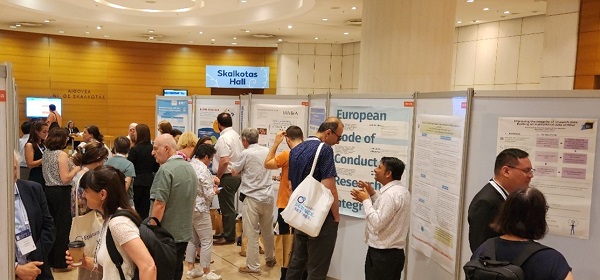
Theme of the 8th WCRI
The theme of the 8th WCRI was "Catalysing the translation of research into trustworthy policy and innovation." According to the materials distributed to the participants in advance, whereas up to now, research integrity efforts have been aimed at and contributing to improving research activities at research institutions, there is now a need to expand and deepen the scope so as to increase the linkage between research activities, innovation, and policies, and include the perspectives of the industry actors, SMEs, and policymakers who pursue them. This theme was set to reflect an awareness of that. It was also proposed in light of the discussions at past WCRI and the experience during the pandemic, which saw science and policymaking interacting in complex ways in real time. Dr. Panagiotis Kavouras (National Technical University of Athens), a member of the local organizing committee for the 8th WCRI, said that their main goal was to expand knowledge of how to apply research integrity to innovation and policymaking, adding that this also included the roles industry, and policymakers play in the research and innovation processes.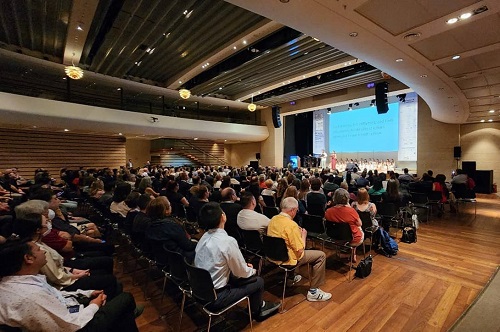
More specific examples that will contribute to these discussions were presented in the 8th WCRI's Plenary A (which had the same title as the theme). Pharmaceutical company employee Dr. Anja Gilis (Johnson and Johnson Innovative Medicine) stated that in addition to the impacts on patients, research integrity-related issues in drug development also pose risks for the companies themselves, leading among other things to impacts on intellectual property, damage to public trust, and various regulatory implications. She pointed out that the quality of data in R&D directly influences various decisions and judgments, and this can also lead to innovations for patients. British researcher Asst. Prof. Daniele Fanelli (Heriot-Watt University) discussed the "replicability crisis" of research results. He talked about how surveys show that while the reproducibility of research results in certain research fields is as high as 70-80%, people who cite and use the results regard them as 100% reliable. He pointed out that, by nature, science is complex and stands on the experimental conditions and various assumptions, and that the level of agreement and expected results differs between fundamental research and the R&D that applies it. Next, Dr. Theodoros Karapiperis (former Head Of Foresight Unit (STOA), European Parliament), who has been involved drafting EU policies on science and technology for many years, spoke about the differences in priorities and ways of thinking between researchers and legislators. In doing so, he brought to bear his own extensive experience, which also includes drafting AI-related legislation.
With a view toward formulating an Athens Statement (provisional title), a conference document had been compiled based on interviews with 10 experts conducted beforehand. This was discussed in the symposiums, focus tracks, and other sessions at the 8th WCRI. Dr. Kavouras stated that the points at issue will be (among other things) the balance of incentives between academia and industry and consistency regarding the quality of R&D, and that the views on them will be collated after the 8th WCRI as part of its outcomes.
Session on research integrity education and international cooperation
The discussion of education on research ethics and research integrity in various countries around the world was also continued at the 8th WCRI as well.In the symposium "Research integrity: improving training and trainer quality," several initiatives were introduced based on the position paper "Seven challenges for research integrity education: current status and recommendations"(https://osf.io/5w9kg/), which was compiled in March 2023 at a meeting for the European Commission-supported project NERQ (Network for Education and Research Quality).
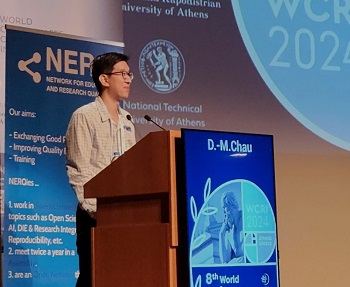

On the other hand, also speaking in an oral presentation session, academic journal publisher employee Dr. Ed Gerstner (Springer Nature) gave a report on a survey of the provision of research integrity training in various countries. The survey showed that 73% of the researchers who responded to it in Japan are being provided with research integrity training by their organizations (including companies, etc.), but worldwide, the percentage of young researchers and students being provided with it is low. He also pointed out that in Japan, research integrity training was mandatory for 95% of the respondents, and 67% of them were only given it online. He went on to say that in an international comparison, these results were the highest out of the countries where the same survey were conducted --i.e., the United States, the United Kingdom, Australia, and India-- and that therefore, they are characteristic of Japan.
(Survey results regarding Japan published on May 24, 2024) (Springer Nature)
(https://group.springernature.com/gp/group/media/press-releases/20240524-japan-research-integrity-survey/27124684))
Various international collaborative projects related to research integrity
The progress and outcomes of international projects based on collaboration by researchers, publishers, and other actors were shared at the 8th WCRI.Supported by EU research funding (Horizon Europe), the TIER2 (Enhancing Trust, Integrity and Efficiency in Research through next-level Reproducibility) project (https://tier2-project.eu/) has been progressing with the aim of gaining knowledge on the reproducibility of research results in diverse research fields, and in addition, the aim of contributing to improving the reusability and quality of research results through creating tools and applying them to the community. In Plenary B, "The future(s) of reproducibility: how reproducibility reform improves research integrity," Dr. Joeri Tijdink (Amsterdam UMC / VU University) said that a high priority of the TIER2 project is to develop a new way to frame reproducibility. He pointed out that reproducibility is a cornerstone of research quality and is also linked to various efforts related to research integrity, but its definitions are also very diverse and complex, varying depending on the research field and context. He spoke about how the project has conducted discussions with researchers, publishers, and various other stakeholders, and that as a result, work is proceeding on (for example) formulating guidelines. He also said that he wants stakeholders to cooperate with efforts to alter research culture and researchers' conduct.
Plenary F, "Perspectives on Research Integrity and Generative Artificial Intelligence," featured a presentation on the accumulation of insights on the research integrity aspects of generative AI. Attending from an academic publishing industry cooperative, Dr. Joris van Rossum (STM Solutions) introduced a white paper compiled in December 2023 titled "Generative AI in Scholarly Communications". (https://www.stm-assoc.org/new-white-paper-launch-generative-ai-in-scholarly-communications/) He suggested practical guidelines based on discussions in the publishing industry, notable ideas being the following: while basic author support tools using generative AI should be allowed, disclosure should be required for anything beyond that; and the creation, alteration, or manipulation of original research data and the crediting generative AIs as authors should not be allowed.
The 8th WCRI saw a diverse range of themes and participants
(Comments from Japanese researchers)Finally, this section will share some of the comments on the 8th WCRI made by researchers from Japan who took part.
・Prof. Jun Fudano (Waseda University)
I felt there were far more participants at this year's WCRI, and that there were also many presenters and attendees from Africa and Asia as well as North America and Europe. Various efforts in Europe are producing results, and I found the presentations on areas like AI and open science especially interesting, since they are apparently being reflected in policies. In a pre-conference workshop that I took part in as a moderator, education and training on authorship developed in the United States were also introduced. I was also impressed by the number of presentations on specific efforts to promote research integrity that have proven to be effective. There were also many presentations by young researchers from a variety of backgrounds and the poster sessions were very successful as well, so I felt that the field of research integrity is expanding and developing on a global scale.
・Prof. Masaki Nakamura (Osaka University)
I felt that the scope of the research integrity topics discussed at the WCRI is getting broader than it used to be, and now covers a wider range of important themes pertaining to research.
For example, in addition to the kinds of themes discussed in Japan, which include how to address research misconduct, questionable research practices, and issues surrounding generative AI, I was impressed by the number of topics about things like reproducibility and research data, and the impact of racial, ethnic, and gender inequalities on research integrity.
・Asst. Prof. Takehito Kamata (Sophia University)
Unlike in previous WCRI, with the 8th, it was not just researchers who were actively involved in the planning and running of the event, but also professionals who are involved in supporting and promoting research. I also took part in the pre-conference workshops and two newly organized social events, and in all cases, young professionals were playing key roles in running them. In terms of human resource development in mid- to long-term international collaboration, I thought that going forward, it will be necessary for not only researchers but also professionals involved in promoting research integrity in Japan to participate in the Network for Education and Research Quality (NERQ) and similar activities and get involved in building the systems for international collaboration.
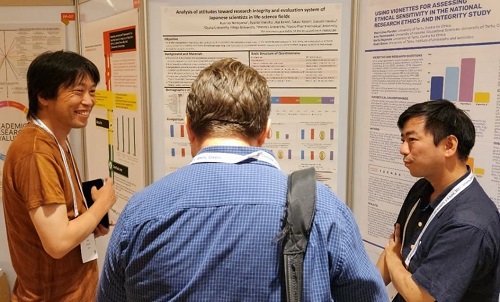
(Prof. Kei Kano, Shiga University and Mr. Soto Tsuruta, Osaka University)
The next WCRI will be held in Vancouver, Canada in June 2026.

